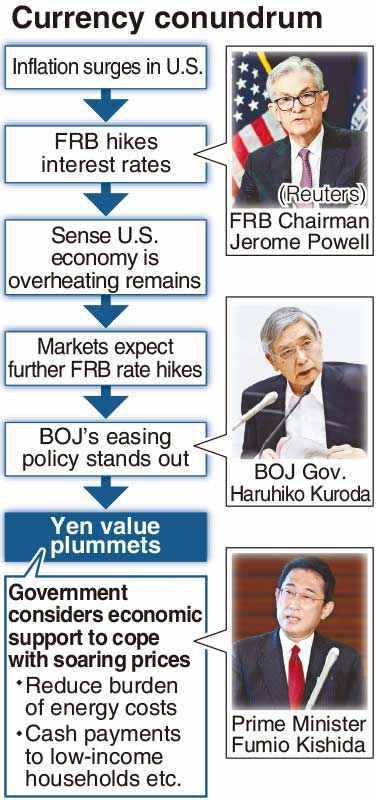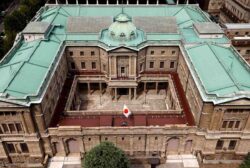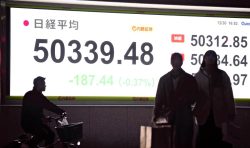16:10 JST, September 8, 2022

The weakening of the yen continues unabated. As part of efforts to buoy the economy, the Bank of Japan appears set to continue its massive monetary-easing policy, in stark contrast to the approach adopted by the United States.
However, the government and the central bank have few options available to tackle the yen’s rapid depreciation amid a trend of yen selling and dollar buying that has gained momentum since the start of the year.
In late January, the exchange rate was ¥113 to the dollar. About seven months later, the rate had slipped by about ¥30 against the dollar, a 20% drop in value.
The rate was ¥144.20 to ¥144.24 as of noon Thursday, compared to ¥143.90 to ¥143.91 the previous day.
According to Mizuho Bank, the yen’s depreciation has eclipsed the drop of about ¥28 recorded in 1989, and is the largest seen since the 1985 Plaza Accord.
“Recent currency movements have been rather rapid and one-sided,” Finance Minister Shunichi Suzuki said about the yen’s weakening. “We’ll stay on our toes and closely watch how the situation unfolds.”
Although Suzuki’s comments briefly restored calm to the markets, the impact did not last for long. Yen selling picked up on overseas markets and the rate neared ¥145 to the dollar.
Depreciation could accelerate
Amid such a situation, speculators are chasing short-term goals.
While the U.S. Federal Reserve Board has lifted interest rates, the Bank of Japan plans, for the time being, to stick to its policy of low interest rates.
“The Japanese government and the Bank of Japan appear unable to intervene in the exchange markets and they can’t raise interest rates,” said Kouichi Fujishiro, a senior economist at the Dai-ichi Life Research Institute. “[Speculators] can see through their policies, and the yen is becoming a target that they can trade with peace of mind.”
According to the Bank for International Settlements, the vast majority of central banks in about 40 of the world’s major nations and regions lifted their policy interest rates between January and July. Japan, China and Turkey were among the few that did not.
This month, the Reserve Bank of Australia has decided to increase its key interest rate by 0.5 percentage points, and there is a strong probability that the European Central Bank will also decide on a rate hike.
FRB Chairman Jerome Powell and other top Fed officials public comments this week, ahead of a Sept. 21 meeting of the U.S. Federal Open Market Committee, which sets monetary policy.
Some market observers predict a pause in the yen’s depreciation if the FRB eases back on the pace of its rate hikes. However, yen selling could accelerate further if the FRB maintains its aggressive approach to jacking up interest rates.
Top Articles in Business
-

Prudential Life Insurance Plans to Fully Compensate for Damages Caused by Fraudulent Actions Without Waiting for Third-Party Committee Review
-

Narita Airport, Startup in Japan Demonstrate Machine to Compress Clothes for Tourists to Prevent People from Abandoning Suitcases
-

Japan, U.S. Name 3 Inaugural Investment Projects; Reached Agreement After Considerable Difficulty
-

JR Tokai, Shizuoka Pref. Agree on Water Resources for Maglev Train Construction
-

Toyota Motor Group Firm to Sell Clean Energy Greenhouses for Strawberries
JN ACCESS RANKING
-

Japan PM Takaichi’s Cabinet Resigns en Masse
-

Japan Institute to Use Domestic Commercial Optical Lattice Clock to Set Japan Standard Time
-

Israeli Ambassador to Japan Speaks about Japan’s Role in the Reconstruction of Gaza
-

Man Infected with Measles Reportedly Dined at Restaurant in Tokyo Station
-

Videos Plagiarized, Reposted with False Subtitles Claiming ‘Ryukyu Belongs to China’; Anti-China False Information Also Posted in Japan





















